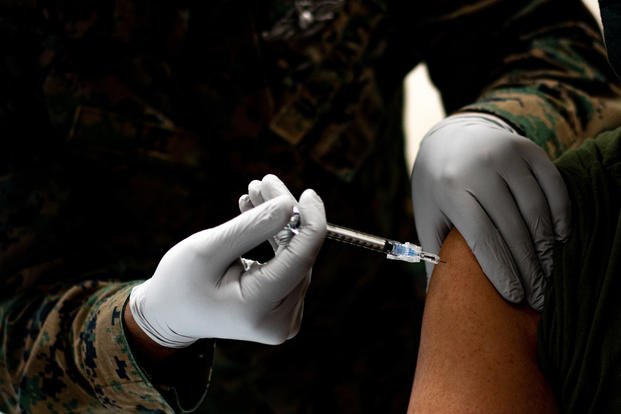Nearly 40% of the 123,000 Marines who have had the chance to receive the vaccine for the illness caused by the coronavirus have turned it down, according to force-wide data obtained by Military.com.
About 75,500 Marines are fully or partially vaccinated against COVID-19, which has killed almost 3 million people worldwide, including two dozen U.S. troops. Another 48,000 Marines who've been given the chance to take one of the vaccinations, which medical experts say significantly decrease the likelihood one will die or require hospitalization from the disease, have declined it, Marine Corps data shows.
The Marine Corps is the first military service to release detailed data, first reported by CNN, on the take-rate for vaccinations offered to uniformed personnel. The Defense Department is not currently allowed to require the shots without consent since the vaccines are currently under an emergency-use authorization by the Food and Drug Administration.
Members of II Marine Expeditionary Force, based in North Carolina, have been about twice as likely to decline the vaccine compared to personnel on the West Coast or in Japan.
The Marine Corps has offered the vaccine to about 29,300 II MEF personnel. About 17,500 -- or nearly 60% of them -- have turned it down. That decline rate is compared to about 28% of the 30,600 Marines assigned to I MEF on the West Coast and about one-third of the 22,400 Marines assigned to the Japan-based III MEF.
About 102,000 Marine personnel have not yet been offered the vaccine, said Capt. Andrew Wood, a spokesman at the Pentagon. As for those declining it, Wood said there are a host of reasons why a Marine might be turning it down.
The Marine Corps is a mostly young and healthy force. They might be giving up the shot so others can have the chance to take it, Wood said, or might be waiting for the vaccine to become mandatory. Just because they turn it down once doesn't mean they'll be shut out from getting another opportunity, he added.
"Service members who decline one day can change their mind and become vaccinated when the next opportunity presents itself," Wood said.
The Marine Corps didn't offer any insight as to why personnel with II MEF seem to be more hesitant to get the vaccine. Military officials in North Carolina told Carolina Public Press in March that they were fighting misinformation about the COVID-19 vaccine spreading on social media.
"We have to inoculate the force from the virus, and we have to inoculate the force for vaccine misinformation," Lt. Col. Thomas B. Turner, who is leading vaccination planning for active-duty Marines at Camp Lejeune, told the outlet.
Wood said leaders are working with commands to ensure Marines and sailors are getting accurate information about the vaccines and their safety, so they're encouraged to get immunized.
"The key to addressing this pandemic is building vaccine confidence," Wood said.
Vaccine hesitancy isn't limited to the Marine Corps or the military community. About 30% of Americans polled by the Pew Research Center in February said they were unlikely to take the COVID-19 vaccine.
Participants cited the quick speed at which the vaccine was developed or lack of information about how well it'll work as top reasons they would opt against it.
Military leaders have already said troops will likely be required to get the COVID-19 vaccine once the emergency-use authorization status is lifted, but the designation could remain for up to two years while the FDA assesses the vaccines' effectiveness and their side effects.
Dr. Anthony Fauci, President Joe Biden's chief medical adviser, pleaded with military families during a town hall last month to trust the vaccines. Service members and their families are "part of the solution to this outbreak," Fauci said during a Blue Stars Families event.
"It is absolutely critical that we get the military vaccinated," Fauci said, adding that opting against taking the shot could make them inadvertently "part of the problem" since they might transmit the disease to someone else while having no symptoms themselves.
Those declining the vaccine, Fauci said, "like it or not -- you're propagating this outbreak."
-- Gina Harkins can be reached at gina.harkins@military.com. Follow her on Twitter @ginaaharkins.
Related: Army Begins Clinical Trials on Vaccine That May Be Effective Against All Coronaviruses











